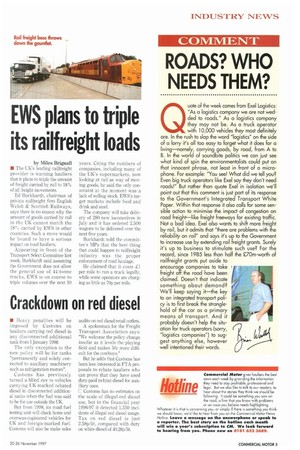ROADS? WHO NEEDS THEM?
Page 7

If you've noticed an error in this article please click here to report it so we can fix it.
uote of the week comes from Exel Logistics: "As a logistics company we are not wedded to roads." As a logistics company they may not be. As a truck operator with 10,000 vehicles they most definitely are. In the rush to slap the word "logistics" on the side of a lorry it's all too easy to forget what it does for a living—namely, carrying goods, by road, from A to B. In the world of soundbite politics we can just see what kind of spin the environmentalists could put on that innocent phrase, not least in front of a microphone. For example: "You see! What did we tell you? Even big truck operators like Exel say they don't need roads!" But rather than quote Exel in isolation we'll point out that this comment is just part of its response to the Government's Integrated Transport White Paper. Within that response it also calls for some sensible action to minimise the impact of congestion on road freight—like freight freeways for existing traffic. Not a bad idea. Exel also wants to shift more freight by rail, but it admits that "there are problems with the reliability on rail" and says it's up to the Government to increase use by extending rail freight grants. Surely it's up to business to stimulate such use? For the record, since 1985 less than half the £70m-worth of railfreight grants put aside to encourage companies to take freight off the road have been claimed. Doesn't that indicate something about demand? We'll keep saying it—the key to an integrated transport policy is to first break the stranglehold of the car as a primary means of transport. And it probably doesn't help the situation for truck operators (sorry, "logistics companies") to suggest anything else, however well intentioned their words.
















































































































